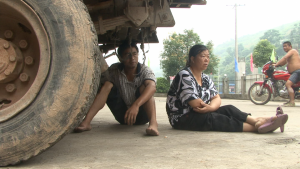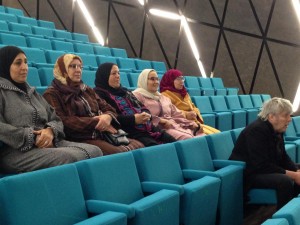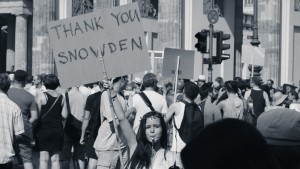At IDFA 2015, the largest documentary film festival in the world, a good clutch of films, marked by their strong allegiance to observational-style cinéma vérité, demonstrated the power of the form to reveal insights hidden from the headlines.

Cinéma vérité is the favorite whipping boy for many filmmakers, not least Errol Morris, who congratulated himself once again while at IDFA for rebelling against its tenets, and Fred Wiseman, whose latest work was also on display there. And no one would want to mistake cinéma vérité for uncut reality.
But over the decades, the distance between those who claimed they only observed (and didn’t acknowledge their role in shaping either the reality they filmed or the story they eventually told) and those who wanted to provoke realities they could film has shrunk. Technical capacities have grown while costs have plummeted, creating possibilities for stories in places and from people we could never have heard from before.
Experience as story.
The invitation to live with people whose lives you may never even have imagined, to be faced with their choices and meet the people and circumstances that condition them, is a chance to see into unimagined worlds.
Cinéma vérité is sometimes used by filmmakers for its seeming transparency, to make claims for truthfulness and fairness, and it was clear with some of the standouts at IDFA that the form itself allowed filmmakers to stand behind their subjects. As one Chinese filmmaker said, “We use cinéma vérité because Chinese people think that is ‘real’ documentary,” unlike much of Chinese TV, which is well recognized as crafted for official messages.
But well-crafted cinéma vérité always honors the power of a story revealed by a filmmaker through the experiences chronicled.
Movies that can’t go home again.
Several of the IDFA cinéma vérité standouts came from China, where independent documentarians are daring to tell stories that can’t always go home again after showing at international festivals. Zanbo Zhang’s The Road is a suitable successor to last year’s award-winning festival shocker, The Chinese Mayor (by Hao Zhou). It follows the construction of a road project in provincial China, where the corruption and high-handedness of the private construction firm (Oh, that was your house? Your tree? Your grandmother? Talk to someone else) match and sometimes butt head-on with that of the local officials (Really? No bribe? Meet our thugs). In between are the workers, the residents, and some of the frustrated middle managers.
The film is constructed in five chapters, each featuring conflicts in the course of the road’s construction, until the last moment, when the road’s opening and national holidays offer a stark contrast between participants’ cynicism and official pomp. The film is eye-opening at every level, not least that of giving us knowledge of daily life and daily work in a country we have too few mental images of.
Patriots and migrants.
Two other Chinese films also demonstrated that The Road is not a fluke exercise in cinema verite. Du Haibin’s A Young Patriot follows a wildly patriotic high school student as he goes to college and his understanding of what constitutes responsible patriotism becomes much, much more complicated. It too offers unprecedented glimpses into Chinese life—a political science class where a prof blithely explains Chinese exceptionalism, for instance, and a student charity trip to give children of ethnic migrant workers of the booming industrial economy a crash course in reading and math, since they are left along with the aged and infirm in a town abandoned even by its teachers. And the central character’s evolution is compelling.
Another example is Yun Ye’s Look Love, which follows two children—one rich, one poor, but both children of internal-migrant workers who have had to abandon them to provide for them. Seeing their daily lives, one at boarding school and one a dropout aimlessly looking for trouble, makes you feel the collateral emotional damage of a huge displacement that is said to account for some 300 million people in China.
Whether such work will be shown in China is doubtful, but it probably will be shown in Europe and the US; several of the Chinese films at IDFA had backing from IDFA Bertha Fund, Britdocs and/or ITVS.
Women’s rights.
Another well-supported example of cinéma vérité about uncharted worldswas the Audience Award-winning Sonita, by Iranian director Rokhsareh Ghaem Maghami. Backed by many European broadcasters as well as NHK, Chicken and Egg Pictures, IDFA Bertha Fund and Britdocs, the film chronicles the rise of an unlikely rap artist: 18 year old Sonita, an Afghan refugee in Iran who is threatened with early marriage and return to a conflict-torn Afghanistan. Her rap, in protest of the conditions of women, is powerful testimony to the fact that many girls who don’t have Sonita’s charisma, talent and poetry can’t escape. Look for it on US TV.
In Chloe Ruthven’s Jungle Sisters, we follow an English woman (the filmmaker’s sister) charged with recruiting South Asian rural girls for factory work. The girls are excited but frightened to leave their rural village home, where early marriage is the only option; in the city, they chafe at the long work days and lockdown conditions of their dorm. Home beckons, but they know it comes with a sentence of early marriage. Meanwhile, the English woman fights for better working and living conditions in the city, and for a chance for more choice for the girls, but is up against ruthless terms of industrial production. This calm but provocative look at the limited choices all the women face adds important complexity to any discussion of development.
Hadja Lahbib’s Patience, Patience, You’ll Go to Paradise was terrifyingly timely, at a moment when Belgium was under lockdown because of terrorist threats. In this film, you meet middle-aged Moroccan wives and mothers in Brussels who are, finally, getting an education and learning to stick up for themselves. They’re inspired by one of their own who became a singer about the very conditions they’re climbing out of. While the film badly needs an editor, the characters are extraordinary, and the conditions they are emerging from—a lifetime of submission and domestic imprisonment in a foreign country—are shocking.
What would you do?
Other films put the viewer on the inside of challenges we may never have imagined. Apostolos Karakasis’ Next Stop: Utopia is a frank, gimlet-eyed view of a doomed factory takeover in Greece. Just what goes wrong, how and why, should be riveting for anyone who wants to get beyond anti-capitalist romance about economic crisis. Much is terribly wrong with the Greek economy, and these sometimes valiant, sometimes hapless guys are just trying to save their jobs.
In Roman Bondarchuk’s Ukrainian Sheriffs (it won a special jury award), we get an insider’s view of a different political problem, one that oscillates between hilarious, terrifying and endearing. Two nice guys with little tin badges maintain the peace in a remote Ukrainian village beset with daily upsets like alcoholics acting out, spousal abuse and—no kidding—a duck theft. Oh, and then there’s international crisis, with Russia menacing the border. And how does that leave them time for cleaning up abandoned sites, digging graves and collecting Christmas presents for the soldiers on duty trying to keep the Russians out? If you know any easy answers, the sheriffs would probably like to know.
In tradition of Control Room and Page One, Malek Bensmail’s Checks and Balances gives us a day in the life of an independent Algerian newspaper. The harried editors and reporters are covering an election where an aged but absent president with a tight grip on the country’s assets and his retinue has the lead. While the film may catch those not following Algerian politics a little flat-footed, the frankness of the newsroom discussion, in a country where nothing can be said publicly and safely, should amaze any viewer. This is one for journalists everywhere, and anyone who cares about the actual production conditions of information citizens can use.
Finally, for the hard-core policy wonks among us, there’s David Bernet’s Democracy, which serves as a reprimand to those of us who thought nothing happens in the EU parliament. It follows, in black and white and with sometimes tedious deliberateness, the work of the modest, dogged Green Party rep who shepherds the process of creating the data security bill that puts limits on ISPs like Google and international corporations sharing of EU-generated online data. The bureaucrats, the public interest activists, the corporate lobbyists are all there. It’s a reminder that on the ground, complex negotiations really need a few patient, committed good listeners. For this one, you have to care about how a bill really becomes a law, but if you do, you will be awed at the access this film provides.
To see work that distills months and years of close observation, close relationships with subjects, and careful understanding into complex stories revives the promise of cinéma vérité.




